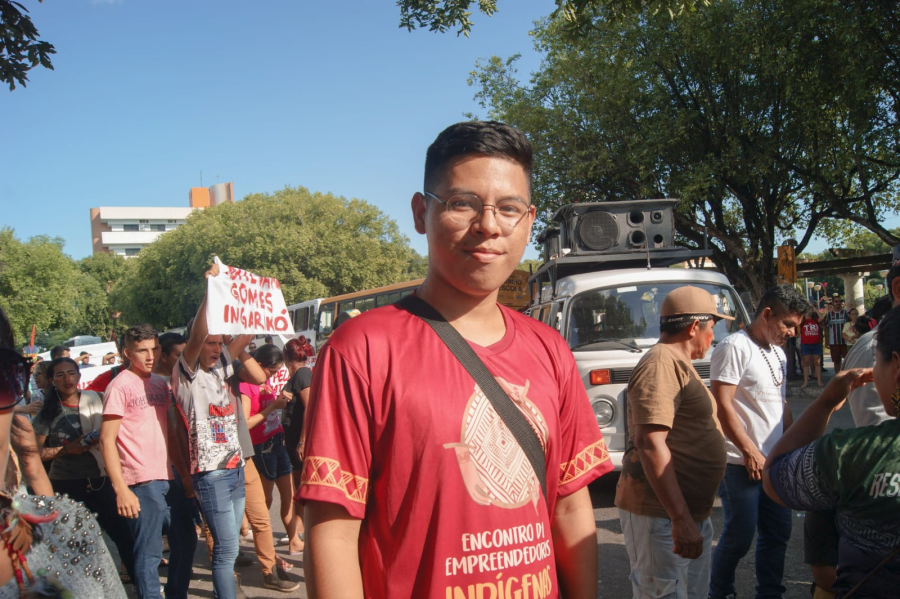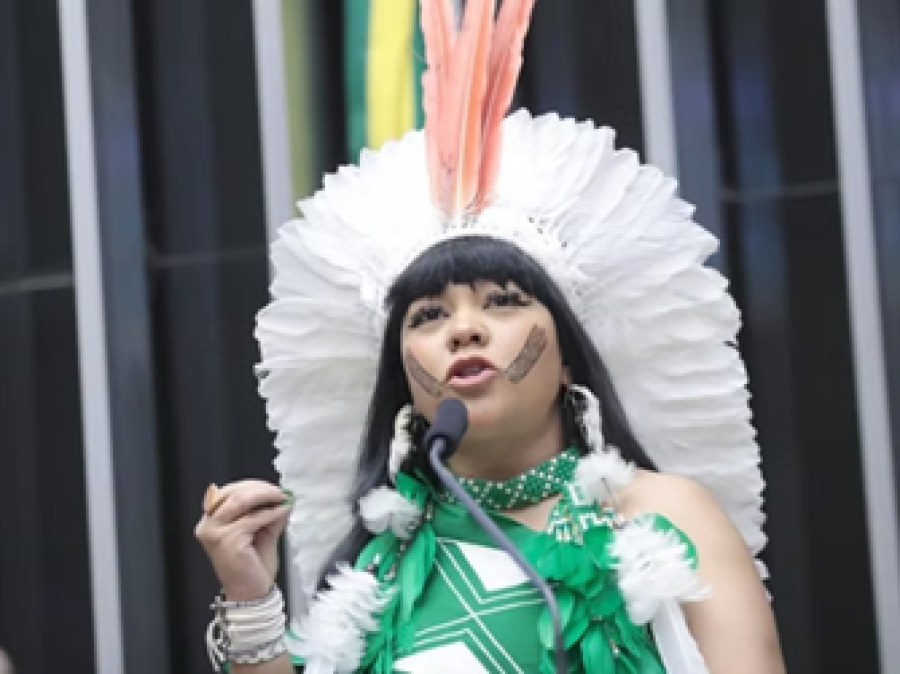
On May 19-21, 2023, representatives of many Indigenous Peoples, Quilombola communities, vazanteiros (seasonal farmers), fishermen, vacarianos (traditional cattle herders), geraizeiros (people from the Cerrado region), Romani people, carroceiros (carters), congadeiros (participants in Afro-Brazilian religious processions), reinadeiros (participants in cultural celebrations), terreiro communities, criapanhadoras de flores (flower gatherers), veredeiros (people from veredas ecosystems), chapadeiros (people from plateau regions), traditional faiscadores (gold miners), as well as civil society organizations, social movements, social pastoral groups, researchers, parliamentarians, and representatives of supporting justice institutions, gathered at the Meeting of Traditional Peoples and Communities of Minas Gerais in defense of Territories and the Right to Prior, Free, Informed, Consensual, and Good Faith Consultation.
In these rich days of debate and coordination, infused with ancestral mysticism and liberating spirituality, we reaffirm the right to traditional territories and the good life. The culture, social and political organization, nature, social practices, history, memory, and territory of each of the Traditional Peoples and Communities are assets that must be preserved by the Brazilian state and the state of Minas Gerais. Traditionality and the rights derived from it must be guaranteed.
Moreover, it is the Traditional Peoples and Communities who bear the greatest responsibility for the preservation of Mother Earth, water, forests, and woodlands. Preserving these territories also means preserving the objective conditions of life for all of humanity and ensuring the rights of nature and the entire sociobiodiversity.
However, we denounce that the state of Minas Gerais systematically violates the rights of Traditional Peoples and Communities. Under the guise of a false development project, large-scale mining ventures have devastated entire communities, contaminated water sources, and exposed people to serious health issues. Many individuals have lost their lives due to the consequences of the crimes committed by the Vale mining company in the Doce and Paraopeba River basins. They continue to suffer without the means to work, without homes, and without receiving full reparation, despite the passage of years.
Even with the vivid memory of these crimes, the state of Minas Gerais, under the mismanagement of Governor Zema, persists in pursuing this exploitative model, offering up traditional territories like the Jequitinhonha Valley to foreign mining companies, disregarding the existence of the Peoples who have inhabited these territories for centuries.
In addition to mining companies, monoculture eucalyptus plantations, and agribusiness have also been responsible for the displacement of many communities. These communities also suffer from land-grabbing processes orchestrated by large landowners and corporations. There is a lack of public policies that guarantee the rights of these Peoples, while there are abundant resources and incentives for large landowners to destroy the environment and our well-being. In Minas Gerais, more than half of Brazil's eucalyptus monoculture is found, and over the past decade, our state has recorded the highest number of workers in slave-like conditions. We can no longer tolerate the atrocities committed by the government of Minas Gerais, led by Romeu Zema, in collusion with large corporations and with the complicity of the Judiciary.
In another affront to the rights of Indigenous Peoples and Traditional Communities, in April 2022, Joint Resolution No. 01/2022 was published by the Secretariat of State for the Environment and Sustainable Development (SEMAD) and the Secretariat of State for Social Development of Minas Gerais (SEDESE), which undermines the right to prior, free, and informed consultation and consent, as well as the right to self-recognition of Indigenous Peoples and Traditional Communities. Therefore, we demand the immediate repeal of this Resolution!
Through this Political Charter, we reaffirm the existence of diverse segments of Indigenous Peoples and Traditional Communities in Minas Gerais, each with its own culture, social and political organization, territory, and knowledge, which must be respected and valued as the greatest heritage of the state.
Unfortunately, we share various violations of our sovereignty, threats to our territories, and anger at the realization that the state of Minas Gerais does not fulfill its protective role in guaranteeing our rights. Despite this, we also share the strength of our ancestors, our leaders, our traditions, and the spirituality that sustains us day after day and does not allow us to cease our struggle. We exist and will always resist in the unwavering defense of our knowledge, traditional territories, customs, and ways of life, with rights and dignity.
For this reason, we demand that (adapted):
- Respect Our right to Prior, Free, Informed, and Good Faith Consultation and Consent is enforced, and our Consultation Protocols. We have the right to say no;
- Strengthen the Program for the Protection of Human Rights Defenders in the state of Minas Gerais, so that it actually fulfills its role of protecting threatened leaders and communities at risk and vulnerability;
- Recognize and regularize the traditional territories of Quilombola and Indigenous Peoples that are at risk without their lands.
- The Government of Minas Gerais must respect the self-determination of Traditional Peoples and Communities, regardless of issuing a certificate;
- The Federal Supreme Court must recognize the original right of indigenous peoples to their territories, regardless of any time frame;
- The communities affected by the brutal socio-environmental crimes that occurred in the state of Minas Gerais are guaranteed full compensation for the damage suffered;
- Suspend immediately all environmental licensing that affect Traditional Peoples and Communities until our rights, including the territorial right and the Prior, Free, Informed and Good Faith Consultation and Consent;
- We demand a serious investigation of the relations between the Public Prosecutor's Office of Minas Gerais and large companies, especially mining companies, which make our (r)existences difficult, with appropriate punishment for those who unduly benefit from them;
- Respect for the Traditional Carroceira Community of Belo Horizonte and the Metropolitan Region of Belo Horizonte, whose rights have been violated through the proposition of laws. Like all Traditional Peoples and Communities.
- Stop environmental racism, which in the false idea of separation between humans and nature, denies the rights to life and territory, violates not only ILO Convention 169, but our traditionality in these communities;
- Respect for the Traditional Peoples and Communities of the Jequitinhonha Valley and the Rio Pardo Valley, strongly affected by the Zema government's onslaughts with projects such as the "Lithium Valley Project", which involves the sale of our territories, reducing them to "riches". minerals”, for foreign capital. We are not Vale do Litio, we are Vale do Jequitinhonha!
We are also the São Francisco River, the Doce River, the Paraopeba River, the Serra do Brigadeiro, the Serra do Curral, the Serra do Rola Moça, the Serra da Moeda, the Serra da Canastra, the Serra da Serpentina, the Serra do Caparaó , Serra do Espinhaço and many other mountains, caves, plateaus, waters, woods, forests and cities, in an infinity of territories. We exist, we are the true wealth of this state of Minas and Gerais and we will not rest until our rights, ways of life and traditional territories are respected.
Ribeirão das Neves, MG, May 21, 2023.
Signatures to this Political Charter:
1 - Cinta Vermelha-Jundiba village, Pankararu-Pataxó people 2- Geru Tukunã Pataxó village, Açucena
3 - Evergreen Flower Pickers
4 - Brazilian Association of People Affected by Large Enterprises (ABA)
5 - Paraguay Quilombola Community Association
6 - United Association of Carroceiros and Carroceiras of Belo Horizonte and Metropolitan region
7 - Commission in Defense of the Rights of Extractive Communities (CODECEX)
8 - Quilombola Commission of the Upper and Middle Rio Doce
9 - Gueguê Indigenous Community of Blood PI in MG
10 - Quilombola Community Ilha Funda, Parakeet
11 - Quilombola Community Águas Claras, Virgolândia
12 - Quilombola Community Campinhos, Congonhas
13 - Quilombola Community Ticks of Tabatinga, Bom Despacho
14 - Quilombola Community of Gesteira
15 - Quilombola Community of Pontinha, Paraopeba
16 - Quilombola Community Araújo Family, Betim
17 - Quilombola Community Mutuca de Cima, Coronel Murta
18 - Quilombola Community Paraguay, Felisburgo
19 - Traditional Community of Faiscadores, Santa Cruz do Escalvado, Rio
Doce e Chopotó
20 - Jornal A Sirene
21 - Traditional Garimpeira Community of Alto Rio Doce
22 - Traditional Geraizeiras and Vacarianas Communities of Vale das Cancelas, north of MG
23 - Community Intermunicipal Council of the Geraizeiro Traditional Territory of Vale das Cancelas, north of MG
24 - National Coordination of Articulation of Black Rural Communities Quilombolas (CONAQ)
25 - Federation of Quilombola Communities of the State of Minas Gerais - Ngolo
26 - National Forum of Traditional Communities and Peoples of Brazil
27 - Kilombo Família Souza, Santa Teresa, Belo Horizonte
28 - Aranã Caboclo Indigenous People, by Coronel Murta and Araçuaí
29 - Xakriabá Indigenous People, north of MG
30 - Peoples and Communities of Ancestral Religious Tradition of African Matrix (PCTRAME)
31 - Quilombo Vargem do Inhaí
32 - Baú Quilombola Community, Araçuaí
33 - Quilombo de Raiz
34 - Quilombola Network of the Belo Horizonte Metropolitan Region
35 - Statutory coordination of quilombola women in the state of MG Mariana Creole
36 - Pontal Quilombola Community, Paracatu
37 - Machadinho Quilombola Community, Paracatu
38 - Quilombola Community São Domingos
39 Quilombola Pesqueira and Vazanteira Community of the Caribbean
40 - Pesqueira and Vazanteira Quilombola Community Sangradouro Grande (Family Lídia Batista and Baleeiro)
41 - Ilé Axé Alá Tooloribi
42 - Quilombola Association of São Domingos do Prata
Supporting Organizations of this Political Charter:
43 - Caritas Brasileira Regional Minas Gerais
44 - Eloy Ferreira da Silva Documentation Center (CEDEFES)
45 - Center for Popular Education and Support for Community Development
Rural areas of the Cerrado (CEPAC), Montes Claros
46 - Collective Margarida Alves of People's Advice
47 - OAB-MG Support Committee for People's Advocacy
48 - Pastoral Land Commission (CPT/MG)
49 - Indigenous Missionary Council / East Regional (CIMI East)
50 - Pastoral Council of Fishermen (CPP)
51 - Movement of People Affected by Dams (MAB)
52 - Movement of Landless Rural Workers (MST)
53 - Rural Workers' Movement (MTC)
54 - National Movement of Traditional Fishermen and Fishermen of the Brazil (MPP)
55 - Study Group on Environmental Themes (GESTA/UFMG)
56 - Instituto Dom Tomás Balduíno
57 - Kaipora - Laboratory of Biocultural Studies at UEMG
58 - Movement for Popular Sovereignty in Mining (MAM)
59 - National Network of Popular Lawyers (RENAP)
60 - Land of Rights
61 - Kamakã-Mongoió Indigenous Land, Brumadinho
62 - Quilombola Territory of Brejo dos Crioulos
63 - Women of Sands NGO
64 - Council of Racial Equality of Paracatu
65 - State Association for Environmental and Social Defense - Aedas
66 - Afro-Brazilian Pastoral
67 - Mandate of State Representative Andreia de Jesus
68 - Term of office of State Representative Beatriz Cerqueira
69 - Term of office of State Representative Bella Gonçalves
70 - Term of office of State Deputy Leninha
71 - Term of office of State Deputy Leleco Pimentel
72 - Term of office of State Representative Macaé Evaristo
73 - Term of office of State Deputy Betão
74 - Mandate of Federal Deputy Célia Xakriabá
75 - Mandate of Federal Deputy Padre João
76. Cultural Survival



